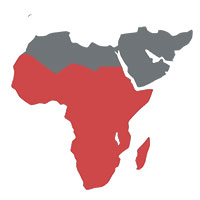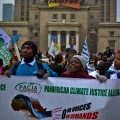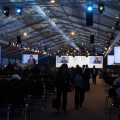Despite having done little to cause it, Africa is one of the regions hardest hit by climate change. Tackling this injustice at the UN climate talks is the Africa Group, who represent the region’s 54 countries and over one billion people.
Lacking the funds of developed countries and the negotiating clout of emerging economies, the group had a weak negotiating position in the early years of the climate talks. Though many of Africa’s priorities and challenges are unique, it has often relied on the far more heterogeneous Group of 77 developing countries and China to represent its interests.
But frustration with this approach is growing. The G77+China comprises some of the biggest emitters in the world, including China and India. These countries wish to continue their astronomical economic growth in the decades to come and many oppose taking-on emissions limitations. This runs directly counter to the interests of African countries.
Temperatures in the continent are expected to rise to between 2.6 and 4.8°C by the end of the century; producing more droughts, floods, food insecurity and epidemiological risks in a region already facing significant development challenges.
Another point of contention between African states and other members of the G77+China is the Clean Development Mechanism (CDM), a market-based instrument that allows developed countries to offset their emissions—at least in theory—by contributing to sustainable development in developing countries.
Discussions are underway to make this mechanism more accessible for the Least Developed Countries (LDC), but large developing countries have been less than supportive of a mechanism that they see as no longer going their way. “They are working on its demise”, complained one frustrated delegate from an African LDC on Wednesday to The Verb. “They try to block all discussion that will ensure progress”.
Adding to tensions in the G77+China group are the views of the oil-producing nations. These nations would like to see part of the climate financing that is being made available by developed countries used to cushion the lost revenues they anticipate as a result of future decarbonisation. With a 2013 UN report highlighting that Africa’s adaptation costs could reach US$150-350 billion annually by 2070, this position is incompatible with meeting the needs of African countries in the future.
As a result of these tensions, the Africa Group is becoming increasingly proactive about defending its interests. Climate change is high on the political agenda of most African states. With the help of donors, they have invested significantly in capacity-building and the training of negotiators. In 2009, they initiated the Conference of African Heads of State and Government on Climate Change (CAHOSCC); a subcommittee of African leaders who provide high-level leadership to African negotiators. A dedicated African Climate Policy Centre in Addis Ababa also conducts research for African states on the topic.
And these efforts have yielded substantial results. In Copenhagen in 2009, African states helped influence the outcome on finance. During climate negotiations in Durban in 2011, African states, either individually or as part of the Group, introduced around the same number of submissions and agenda items as in the entire period from 1991 to 2005. Together with the European Union, the Alliance of Small Island States (AOSIS) and the Least Developed Countries Group, the Africa Group helped shape the outcome towards a new legally binding agreement and a second commitment period of the Kyoto Protocol by breaking ranks with certain G77+China parties. At the climate talks currently being held in Lima, Peru, the Africa Group, last Thursday, tabled a proposal on financing that has garnered much attention.
Given this growing influence, is it time for the group to stand on its own feet?
Appetite for moving in this direction appears to be growing. According to Washington Zhakata, a senior Zimbabwean negotiator: “There should come a time when the Africa Group stand as a group on its own. It will be more effective for sorting out our issues.”
Of course, such an undertaking will not be easy. Internal politics and power relations within the African continent are complex, and the capacity limitations faced by African states are still considerable. Breaking from the G77+China group would diminish Africa’s participation in numerical terms, but it could allow the continent to engage more fully with its own distinct and urgent priorities. The sizeable clout of Small Island Developing States (SIDS) in the negotiations may serve as an example of how a group of countries with relatively limited financial means but a strong message can affect negotiation outcomes.
On how soon this, African countries achieving autonomy in the climate negotiations, should happen, Zhakata is apt: “the sooner the better”.













comment